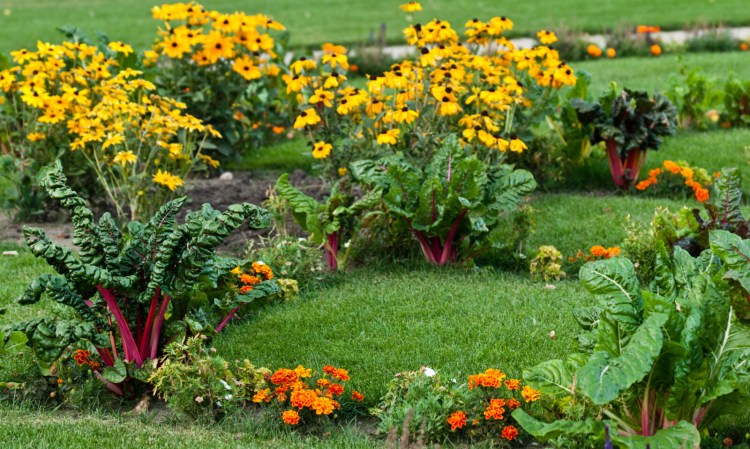Food plants can provide beauty as well as nutrition.
There is no reason that a flower garden, designed for beauty, can’t also provide something for the dinner table. And the opposite is true, too: a vegetable garden can also be attractive. Many plants have dual purposes.
What brought these thoughts to mind was looking at the leaf lettuce in our vegetable garden that is almost, but not quite, ready to be harvested. I planted a rainbow mix for our first batch this year. The Pinetree Garden Seeds packet had both red- and green-leaved varieties, which are as attractive as they are tasty.
Gardeners who don’t have a vegetable garden could easily grow a pretty-leafed lettuce on the front edge of their flower gardens or as an edging along the walkway to the house.
I started this column with lettuce because that is what caught my eye in our garden. We grow mostly leaf lettuce, as a cut-and-come-again crop, but head lettuces come in many shapes and colors, and also would be attractive.
Many other vegetables needn’t be constrained to a vegetable bed. They can also add to the beauty of a garden.
Bright Lights Swiss chard from Johnny’s Selected Seeds is absolutely gorgeous, standing tall with a mix of colors. Beet leaves are a pretty mix of purple and green. Plant them closer together than the seed packets advise. Then harvest some early for the greens, providing extra room for the remaining plants to be harvested later on in the season for beet roots. I saw an advertisement for a new kale this year called “Rainbow Candy Crush.” I don’t know if it’ll live up to its hype, but it might be worth a try if you can find it.
The lettuces, chards and beets all could have been planted as seed a few weeks ago, but farm stands and farmers markets often have seedlings of these vegetables, which would provide an immediate impact.
These are cool-weather crops, but in a few weeks, try adding warm-weather vegetables with added ornamental value. Dwarf varieties of tomatoes (especially cherry tomatoes), peppers, cucumbers, summer squash and eggplant are often promoted as container plants, but consider putting them in the ground instead. These vegetables are as attractive as many of the flowering shrubs used for perennial borders.
Speaking of shrubs, high-bush blueberries are wonderfully attractive. When horticulturists first realized that burning bush was invasive, blueberry bushes were a suggested replacement. They have small but noticeable white flowers in the spring, lovely berries – at least until you or the wildlife eat them – and attractive red foliage in the fall. Amelanchier, or serviceberry, is another good bush for the garden, although most people prefer the taste of blueberries.
I haven’t even mentioned fruiting trees. The plant that gets the most praise from people walking by our garden is the Lars Anderson peach tree. It has bountiful spring blossoms, and later in the season the peaches are striking, a bright reddish orange on an 8-foot tree. My only complaint is that some critter – I haven’t figured out what, but it might even be human – cleans out our tree about a week before I think the peaches are ripe enough to pick.
And I am hoping that the Red Astrachan apple I just planted will be just as gorgeous in the spring and fall as the mystery apple that we also have.
Just for kicks, I’m going to turn it around: Many plants usually grown for their beauty, such as violas, pansies, roses, borage, day lilies and nasturtiums, are also good to eat. I’ve eaten most of them.
Tom Atwell is a freelance writer gardening in Cape Elizabeth. He can be contacted at: tomatwell@me.com
Send questions/comments to the editors.


